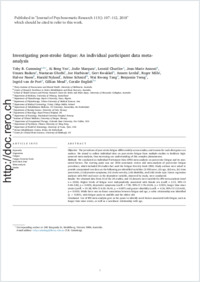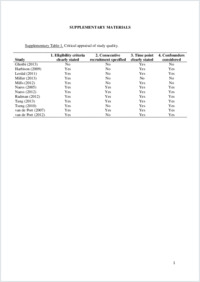Investigating post-stroke fatigue: An individual participant data meta-analysis
- Cumming, Toby B. Florey Institute of Neuroscience and Mental Health, University of Melbourne, Australia - Centre of Research Excellence in Stroke Rehabilitation and Brain Recovery, Australia
- Yeo, Ai Beng School of Health Sciences and Priority Research Centre for Stroke and Brain Injury, University of Newcastle, Callaghan, Australia
- Marquez, Jodie School of Health Sciences and Priority Research Centre for Stroke and Brain Injury, University of Newcastle, Callaghan, Australia
- Churilov, Leonid Florey Institute of Neuroscience and Mental Health, University of Melbourne, Australia
- Annoni, Jean-Marie Department of Medicine, University of Fribourg, Switzerland
- Badaru, Umaru Department of Physiotherapy, Bayero University, Kano, Nigeria
- Ghotbi, Nastaran Department of Physiotherapy, Tehran University of Medical Sciences, Iran
- Harbison, Joe Department of Medical Gerontology, Trinity College Dublin, Ireland
- Kwakkel, Gert Department of Rehabilitation Medicine, VU University, Amsterdam, the Netherlands
- Lerdal, Anners Department of Nursing Science, University of Oslo, Norway
- Mills, Roger Department of Neurology, Royal Preston Hospital, UK
- Naess, Halvor Department of Neurology, Haukeland University Hospital, Norway
- Nyland, Harald Institute of Clinical Medicine, University of Bergen, Norway
- Schmid, Arlene Department of Occupational Therapy, Colorado State University, Fort Collins, USA
- Tang, Wai Kwong Department of Psychiatry, Chinese University of, Hong Kong
- Tseng, Benjamin Department of Health & Kinesiology, University of Texas, Tyler, USA
- Port, Ingridvan de Revant Rehabilitation Centres, Breda, the Netherlands
- Mead, Gillian Centre for Clinical Brain Sciences, University of Edinburgh, UK
- English, Coralie Centre of Research Excellence in Stroke Rehabilitation and Brain Recovery, Australia - School of Health Sciences and Priority Research Centre for Stroke and Brain Injury, University of Newcastle, Callaghan, Australia
-
01.10.2018
Published in:
- Journal of Psychosomatic Research. - 2018, vol. 113, p. 107–112
English
The prevalence of post-stroke fatigue differs widely across studies, and reasons for such divergence are unclear. We aimed to collate individual data on post-stroke fatigue from multiple studies to facilitate high-powered meta-analysis, thus increasing our understanding of this complex phenomenon.Methods: We conducted an Individual Participant Data (IPD) meta-analysis on post-stroke fatigue and its associated factors. The starting point was our 2016 systematic review and meta-analysis of post-stroke fatigue prevalence, which included 24 studies that used the Fatigue Severity Scale (FSS). Study authors were asked to provide anonymised raw data on the following pre-identified variables: (i) FSS score, (ii) age, (iii) sex, (iv) time post-stroke, (v) depressive symptoms, (vi) stroke severity, (vii) disability, and (viii) stroke type. Linear regression analyses with FSS total score as the dependent variable, clustered by study, were conducted.Results: We obtained data from 14 of the 24 studies, and 12 datasets were suitable for IPD meta-analysis (total n = 2102). Higher levels of fatigue were independently associated with female sex (coeff. = 2.13, 95% CI 0.44–3.82, p = 0.023), depressive symptoms (coeff. = 7.90, 95% CI 1.76–14.04, p = 0.021), longer time since stroke (coeff. = 10.38, 95% CI 4.35–16.41, p = 0.007) and greater disability (coeff. = 4.16, 95% CI 1.52–6.81, p = 0.010). While there was no linear association between fatigue and age, a cubic relationship was identified (p < 0.001), with fatigue peaks in mid-life and the oldest old.Conclusion: Use of IPD meta-analysis gave us the power to identify novel factors associated with fatigue, such as longer time since stroke, as well as a non-linear relationship with age.
- Faculty
- Faculté des sciences et de médecine
- Department
- Médecine 3ème année
- Language
-
- English
- Classification
- Biological sciences
- License
-
License undefined
- Identifiers
-
- RERO DOC 323434
- DOI 10.1016/j.jpsychores.2018.08.006
- Persistent URL
- https://folia.unifr.ch/unifr/documents/307299
Other files
Statistics
Document views: 128
File downloads:
- pdf: 453
- Supplementary material: 157

